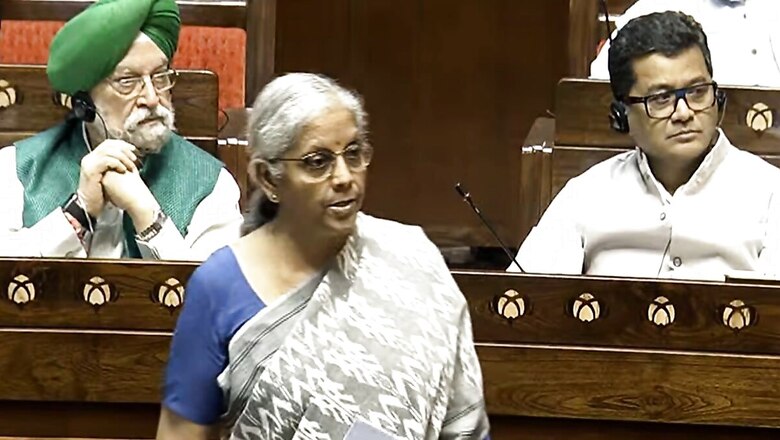
views
By Ritesh Kumar
On 23 July 2024, the Finance Minister presented her speech on the 7th Union Budget, which emphasised the need for a thorough review of the existing Income-tax Act, which was assured to be completed in 6 months. Given this assurance, one might have expected minimal changes to ensure the stability of the tax regime. Contrary to these expectations, the Finance Bill introduced over 80 substantive amendments to the Income-tax Act of 1961.
Among the numerous amendments proposed, the Finance Bill 2024 (Bill) seeks to rationalise the provisions of the 63-year-old Income-tax Act by
- (a) altering the rate structure;
- (b) changing the holding period for classifying capital gains as “long-term” and “short-term”;
- (c) removing the benefit of indexation; and
- (d) revamping the tax regime for buy-backs.
It is now proposed that there will only be two holding periods, 12 months and 24 months, to determine the classification of capital gains as short-term or long-term. For listed securities, the holding period will be 12 months, while for all other assets including unlisted shares and immovable property, it will be 24 months.
The Finance Bill 2024 proposes to standardise the rate of long-term capital gains across all asset categories to 12.5%. Currently, long-term capital gains from the sale of securities on which Securities Transaction Tax (STT) is payable are taxed at 10%, while other long-term capital gains are taxed at 20%.
For short-term capital gains on assets subject to STT such as equity shares, units of equity-oriented mutual funds, and units of a business trust, the rate is proposed to increase to 20% from the current 15%. Other short-term capital gains shall continue to be taxed at the applicable rates.
To “ease computation of capital gains for the taxpayer and the tax administration”, the Finance Minister proposes removing indexation benefits currently available for a property, gold, and other unlisted assets, which otherwise allows taxpayers to adjust the cost of acquisition for inflation when calculating long-term capital gains.
The Bill also introduces significant changes to the taxation of buy-backs in India. According to the memorandum explaining the provisions, there have been suggestions that “references have been received stating that pay-outs on buy-back of shares should be taxed in hands of recipients, in line with the similar regime in place for taxation of dividend”.
Consequently, the Bill proposes that payments made by a domestic company for the purchase of its shares shall be treated as dividends in the hands of the shareholders and taxed accordingly. The cost of buy-back shares will generate a capital loss (given that section 46A has not been removed), and subsequently, the shareholder can set off such losses against other capital gains from the sale of shares or otherwise.
It is, however, important to note that with the removal of indexation, only the original cost can be set off.
When buy-backs were originally introduced in India, buy-back gains were taxed as capital gains, and buy-back proceeds were excluded from the definition of dividends.
The proposed change reverses that position. For non-resident shareholders, the tax implications of buy-backs under the Tax Treaty will need thorough evaluation, as it may result in various tax complications.
The proposed changes have significant implications on the capital market activity, especially given the current engagement of Indian retail and institutional investors.
For asset classes such as REITs and InVITs listed on Indian exchanges, the Finance Bill’s proposals will enhance their appeal to investors, owing to the proposed rate reduction and the decrease in the holding period from 36 months to 12 months.
Similarly, the holding period for bonds, debentures, and gold will also be reduced from 36 months to 24 months. However, the holding period for unlisted shares and immovable property will remain unchanged at 24 months.
The elimination of indexation benefits for computing capital gains tax is likely to impact not only individuals selling immoveable property but also corporate real-estate transactions, where land is handed over on a ‘conveyance’ basis.
Notably, these proposed amendments will be effective from 23 July 2024, i.e., the date on which the Bill was presented. Thus, if enacted, they will apply to transactions conducted after this date. In India, where property inheritance and other capital assets are widespread, taxpayers could face increased tax liabilities from such gains.
On 7 August 2024, the Finance Minister, before moving the Bill for approval in the Lok Sabha, introduced amendments to provide relief from excess tax liability for resident individuals and Hindu Undivided Families (HUFs). This relief, however, does not extend to Limited Liability Partnerships (LLPs), companies, etc.
The proposal aims to restore the benefit of indexation when computing tax payable on long-term capital gains from the transfer of land or buildings or both acquired before 23 July 2024. According to the proposal, the tax payable by individual or HUF sellers would be the lower of the following
- (a) 12.5% of the capital gains without indexation; or
- (b) 20% of capital gains after considering indexation.
It is important to note that for all other purposes such as set-off, carry forward, and the computation of capital loss on account of buy-back, the benefit of indexation has not been extended, i.e., long-term capital loss must be computed without the indexation benefit.
-The author is Partner, M&A Tax & Regulatory Services, BDO India. Views, thoughts and opinions expressed in the article are solely the author’s and are not representative of the author’s employer/organisation.



















Comments
0 comment